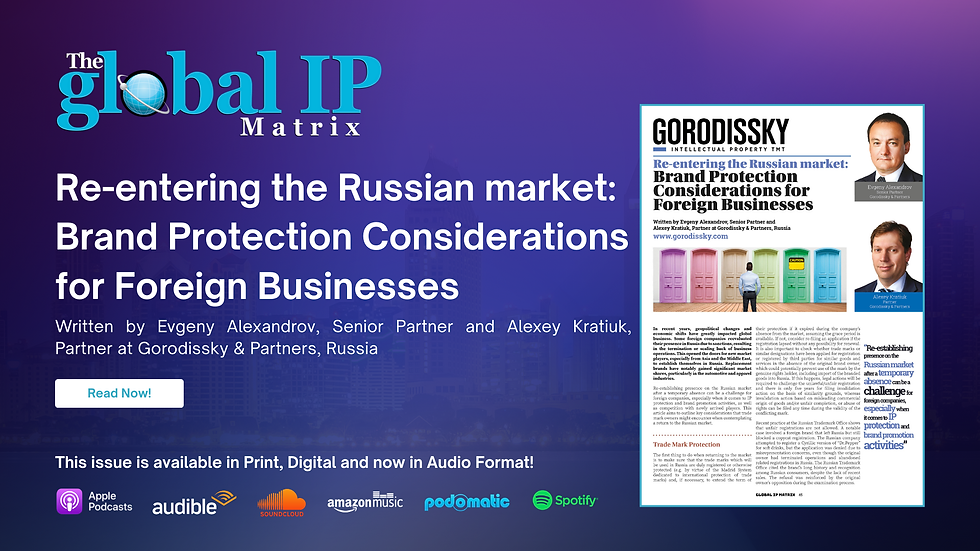Re-entering the Russian market: Brand Protection Considerations for Foreign Businesses by Evgeny Alexandrov
- Hetanshi Gohil

- Jul 14
- 2 min read
Updated: Jul 21
Re-entering the Russian market: Brand Protection Considerations for Foreign Businesses by Evgeny Alexandrov, Senior Partner and Alexey Kratiuk, Partner at Gorodissky & Partners, Russia
In The Global IP Matrix Issue 22, Evgeny Alexandrov, Senior Partner, and Alexey Kratiuk, Partner at Gorodissky & Partners, Russia, provide critical insights for foreign companies considering a return to the Russian market. With shifting geopolitical and commercial landscapes, re-establishing brand presence requires a sharp focus on trade mark protection, enforcement risks, and navigating parallel imports. This article serves as a practical guide for businesses aiming to regain a foothold while safeguarding intellectual property.
Re-Establishing Trade Mark Rights
Businesses re-entering Russia must first verify the status of their trade mark registrations, renew any expired marks, or re-file if protection lapsed without grace period availability. It's also essential to assess whether third parties have registered similar marks during the brand’s absence, potentially blocking use or importation.
Recent Russian Trademark Office decisions suggest that bad-faith filings can be challenged, as seen in the case involving a Cyrillic version of Dr. Pepper, where the Office upheld the original owner’s rights due to the mark’s long-standing reputation.
Use It or Lose It: The Three-Year Rule
In Russia, a trade mark becomes vulnerable to cancellation if not used within three years post-registration. For companies that exited in 2022, this non-use period ends in 2025. The burden of proof lies with the rights holder. Notably, parallel imports typically don’t count toward valid use unless conducted under the owner's control.
Cases like XIAOMI and ERICSSON highlight the courts' emphasis on documented use or legally acceptable reasons for non-use. General references to sanctions or market withdrawal are often not accepted unless specific export restrictions apply.
Navigating the Parallel Import Landscape
Russia generally prohibits unauthorised import of trademarked goods. However, due to post-2022 shortages, the government temporarily allowed parallel imports of approved products under Order No. 2701.
That said, trade mark owners can petition for the removal of their brands from the allowed list if they resume official supply chain operations. Many brands have successfully reasserted their IP control using this strategy.
Is IP Still Enforceable in Russia?
Despite speculation, IP enforcement in Russia remains active and unbiased. The country continues to honour international treaties, including the Paris Convention, Madrid System, and TRIPS.
In a notable case, LEVI’S successfully sued for trade mark infringement, even after withdrawing from the Russian market. The court affirmed that “unfriendly” status or market absence does not justify rights violations.
Conclusion Returning to Russia requires more than a marketing strategy; it demands proactive IP management. Evgeny Alexandrov and Alexey Kratiuk emphasise that Russia's IP framework remains functional and enforceable. With thoughtful planning and legal vigilance, foreign businesses can re-enter confidently, protect their brands, and compete fairly in a changing market.
Read the full article in The Global IP Matrix Issue 22 for expert guidance on IP protection in Russia’s evolving commercial environment.






Comments